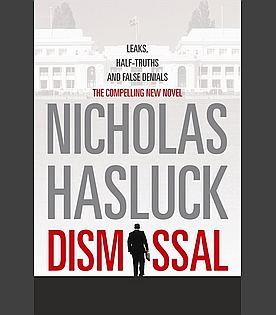The long fallout from youthful idealism and the intoxication of creating a brave new world, Prospero, in the United Nations. Recommended for anyone who remembers 11 November 1975.
‘Long fallout’ is a geologist’s term for the run of material in a seismic shift miles from the fault where the fracture occurred. If I remember it rightly from Wallace Stegner’s novel Angle of Repose (1971). Freya, Simon, and Roy are the protagonists, centring on Roy through whose eyes we see most of it. By the end Roy’s sister Alison, it turns out, was also a more of a player than Roy realized. Oops, that is a spoiler, I guess.

They were motivated by causes in the 1930s and carried those goals into government service during World War II. They had met many True Believers, including Roy’s sister, fellow travellers, dilettantes, voyeurs, and Stalinists. At Oxford they individually had brushed against Left Champions like the Red Peer (who is Erridge in The Dance to the Music of Time). At times they do favours for each other or for friends of friends involving confidential information. At the San Francisco conference founding the United Nations Roy met Alger Hiss. Because of this meeting he is forever slightly suspect. Yet Roy is in but not of this coterie, always a little aloof and withdrawn.
Of course the title refers to the dismissal of the Whitlam government on 11 November 1975 and the lead up to that event provides the context for the reckoning among the three. Will their respective pasts catchup to one or all three of them? What is it that is in the past of each anyway? Should they stick together or seal themselves off from one another?
They had earlier weathered the Petrov Royal Commission with Roy singled out for doubt, though nothing more. He lived it down at the Sydney Bar in the following years. He became a legal consultant to the Whitlam government and like everyone else is caught in the tsunami of the Loans Affair (which seemed then and seems now like something from a Marx Brother movie). If Roy’s past is remembered will it sink the already sinking government? The captain and crew are the only ones who do not realise the boat is already sunk, as they row furiously on. Not sinking, sunk.
The telling is paced and methodical. The pieces slowly come together. The treatment of the many characters from Gough Whitlam, Malcolm Fraser, Garfield Barwick, John Kerr, to Doc Evatt is even-handed. Some pseudonyms are used and it is fun speculating on who these creations represent. I thought Dusty was a slice of Alan Ramsay, not the whole man at the time but an aspect of his earlier self.
There are nice details like the furnishings of Yarralumla, and its origins, a state visit by Vice-President Spiro Agnew, the fishbowl of official Canberra. The formality of Canberra at the time seems a long time ago, seating by status even on a minibus to the airport, an entourage of eight for the Governor-General to go to Sydney for a private visit, etc. all that seems almost foreign, something from another country, not simply another time.
The novel closes with the frenetic effort to find a parliamentary and constitutional means to save the Whitlam government, as if a form of words, or application of an arcane parliamentary maneuver would have stayed the doom. A delay might have held off the doom a few more days but nothing more, but the stalwarts clutch at the straw that public opinion will change.
In 1950s Canberra Roy and company would have come across Edith Berry from Grand Hotel, Dark Palace, and Cold Light. She is a more fully developed character than anyone in these pages. The prose is…workman like. More like a brief that uses some fictional devices to lay out the material than a novel where we enter another world as seen by someone else.
Speaking of connections, Roy’s wife, Judith, is the daughter of the architect of the amphitheatre at Castlecrag. Roy and Judith met at amateur theatrics there. Judith is merely a plot device, apart from that intriguing reference.
This counts as another Perth book because the author lives in Perth, but nothing in the book relates in any way to West Australia except some mentions once or twice of offshore islands considered for nuclear tests.
I have read several of his other novels, Quarantine, The Blue Guitar, Bellarmine Jug, Truant State, The Country without Music, and The Blosseville File. I was once on an APSA panel with Nicholas Hasluck and had lunch with him a few months later on Perth with his father who figures briefly in this book.
Read it in Darwin, August 2013.
Skip to content
